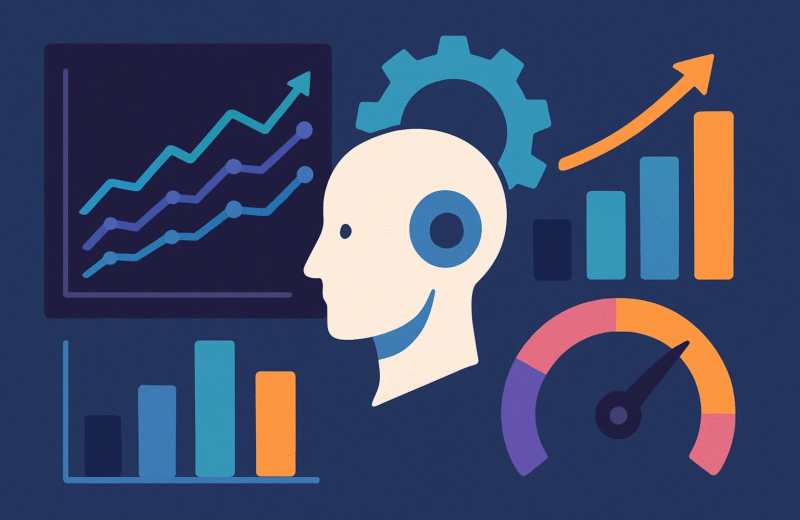Table of content
Quick Summary
AI tools are revolutionising small business operations by automating routine tasks, enhancing customer service, and providing data-driven insights. Top solutions include ChatGPT for content creation, Salesforce Einstein for CRM, and free tools like Google Analytics AI. These technologies level the playing field, allowing small businesses to compete with larger corporations through improved efficiency and reduced operational costs.
AI tools for small businesses have become essential for staying competitive and efficient. Small business owners are discovering that artificial intelligence isn’t just for tech giants – it’s a powerful ally that can streamline operations, boost productivity, and drive growth without incurring significant costs.
The integration of AI tools for small businesses has revolutionised how entrepreneurs approach everything from customer service to marketing campaigns. According to Forbes, these innovative solutions are levelling the playing field, allowing small businesses to compete with larger corporations by automating routine tasks and providing valuable insights that were once only available to enterprises with massive budgets.
What are the Best AI Tools for Small Businesses?

AI tools for small businesses encompass a wide range of applications designed to automate processes, analyse data, and enhance decision-making capabilities. These tools leverage machine learning, natural language processing, and predictive analytics to help businesses operate more efficiently and effectively.
The beauty of modern AI tools for small businesses lies in their accessibility and user-friendly interfaces. Gone are the days when artificial intelligence required extensive technical knowledge or substantial financial investment. Today’s solutions are designed with small business owners in mind, offering intuitive dashboards and straightforward implementation processes.
For small businesses seeking to strategically implement AI solutions, consider our AI advisory services to ensure optimal tool selection and integration.
Organisations can benefit from AI tools for small businesses in numerous ways:
- Customer Service Enhancement: AI-powered chatbots and virtual assistants can handle routine inquiries 24/7, freeing up human staff for more complex tasks
- Marketing Automation: Intelligent systems can personalise marketing campaigns, optimise ad spending, and predict customer behaviour
- Financial Management: AI can automate bookkeeping, detect fraud, and provide financial forecasting
- Inventory Management: Predictive analytics can optimise stock levels and reduce waste
- Sales Optimisation: AI can identify potential leads, predict sales trends, and automate follow-up processes
When implementing AI solutions, it’s crucial to manage technical debt effectively to ensure long-term scalability and maintainability of your technology stack.
Free AI Tools for Small Business
Budget-conscious entrepreneurs will be pleased to discover numerous free options for AI tools for small businesses that deliver substantial value without requiring upfront investment. These free solutions provide an excellent entry point for companies looking to explore artificial intelligence capabilities.
1. Communication and Customer Service
If you’re prioritising customer experience, these communication tools are essential:
AI tools for small businesses in the communication sector include several free options that can transform customer interactions. ChatGPT and other conversational AI platforms – such as Google Gemini and Microsoft Copilot – offer free tiers that small businesses can use for customer support, content creation, and internal communication optimisation.
Zendesk’s free plan includes basic AI features for ticket routing and response suggestions, making it easier for small teams to manage customer inquiries efficiently. Similarly, Facebook’s Messenger chatbot tools provide free automated response capabilities that can handle common customer questions.

2. Marketing and Content Creation
For businesses focused on digital marketing, these tools offer immediate value:
Content creation represents one of the most valuable applications of AI tools for small businesses’ free solutions. Canva’s AI-powered design suggestions help create professional marketing materials without requiring graphic design expertise. AI-powered marketing tools like AdCreative.ai and Writesonic help businesses automate ad creation, optimise targeting, and improve budget efficiency across multiple platforms.
Hootsuite’s free plan includes AI-powered social media scheduling and basic analytics, allowing small businesses to maintain a consistent online presence without manual intervention. These tools demonstrate how AI tools for small businesses can significantly reduce the time and effort required for effective marketing.
3. Data Analysis and Insights
For data-driven decision making, these analytics tools are game-changers:
Google Analytics incorporates AI features that provide automated insights and predictive analytics at no cost. These capabilities help small businesses understand customer behaviour patterns and make data-driven decisions about their marketing strategies and platform flows.
Microsoft’s Power BI offers a free version with AI-powered data visualisation and analysis tools, enabling small businesses to transform raw data into actionable insights. These AI tools for small businesses democratise access to advanced analytics capabilities previously available only to large corporations.
Best AI Tools for Small Business
When evaluating the best AI tools for small businesses, it’s important to consider factors such as ease of use, integration capabilities, scalability, and return on investment. The most effective solutions are those that address specific business challenges while providing measurable improvements in efficiency or revenue.
1. Customer Relationship Management
For businesses prioritising customer relationships:
Salesforce Einstein represents one of the best AI tools for small businesses in the CRM space. This AI-powered system provides predictive lead scoring, automated data entry, and intelligent email insights that help small businesses nurture customer relationships more effectively.
HubSpot’s AI features include conversation intelligence, predictive lead scoring, and automated email optimisation. These capabilities make it easier for small businesses to identify high-value prospects and personalise their communication strategies.

2. E-commerce and Retail
For online retailers and e-commerce businesses:
Dynamic Yield offers personalisation engines that can increase conversion rates by delivering targeted product recommendations. Shopify’s AI-powered features include inventory forecasting, fraud detection, and automated marketing campaigns.
Amazon’s Rekognition provides image and video analysis capabilities that can help small retailers automatically tag products, monitor inventory levels, and enhance security systems. These tools demonstrate how AI tools for small businesses can address industry-specific challenges.
3. Financial Management
For businesses seeking financial automation and accuracy:
QuickBooks’ AI features include automated expense categorisation, cash flow forecasting, and intelligent invoice processing. These capabilities help small businesses maintain accurate financial records while reducing manual bookkeeping tasks.
Xero’s AI-powered reconciliation tools can automatically match transactions and detect anomalies, making it easier for small businesses to maintain financial accuracy. These AI tools for small businesses provide crucial support for financial management without requiring accounting expertise.
4. Content Creation and Copywriting
Content marketing is a huge growth driver, but it’s also time-consuming. AI writing tools help generate ideas, polish drafts, and optimise for SEO.
- Jasper AI: Creates SEO-friendly blog posts, ad copy, and product descriptions, saving time for small teams.
- CopyAI: Useful for brainstorming, drafting social media posts, and creating quick marketing copy.
5. Social Media and Visuals
Engaging content is key to online presence. AI tools simplify design, scheduling, and even caption writing.
- Canva: Offers AI-driven design templates and image editing so non-designers can create professional visuals.
- Flick: Helps with social media scheduling, hashtag optimisation, and AI-generated captions.
6. Workflow Automation
Time is money, and automation helps you save both.
- Zapier: Connects your apps and automates workflows (e.g., moving leads from email to CRM, triggering social posts, or sending alerts).
7. Customer Support and Chatbots
Great customer service doesn’t always require a big team – AI can handle FAQs and first-line support.
- Tidio: Combines live chat and AI chatbots to engage customers 24/7, reducing response times and improving satisfaction.
8. Meetings and Productivity
AI can help teams stay organised, especially when meetings pile up.
- Fireflies.ai: Records meetings, generates transcripts, and pulls out action items so you never miss key details.
9. Video and Design
Video marketing is on the rise, and AI helps small businesses keep up without big budgets.
- Pictory: Turns blog posts or transcripts into engaging video content, making it easier to repurpose existing material.
10. SEO and Marketing Analytics
Understanding what works and what doesn’t is key to growth.
- Semrush: Offers keyword research, competitor analysis, and content gap discovery to improve visibility and attract more leads.
11. Writing Assistance
Clear communication is essential – whether it’s a sales proposal or a customer email.
- Grammarly: Goes beyond grammar correction by suggesting tone improvements, clarity enhancements, and style adjustments.
AI isn’t just for large corporations – it’s becoming an essential toolkit for small businesses too. Whether you want to strengthen customer relationships, automate your financial tasks, create engaging content, or improve support, there’s an AI solution built for you.
The best approach? Start small. Pick one or two tools from the list above that address your most pressing challenge – be it lead generation, social media management, or bookkeeping. As you see results, you can scale your AI stack to cover more areas of your business.
Top 11 AI Tools for Business
Based on functionality, user reviews, and business impact, here are the top 11 AI tools for business that small companies should consider:
1. ChatGPT and GPT-4
Best for: Content creation and customer service
This conversational AI platform excels at content creation, customer service, and problem-solving. Small businesses can use it for tasks ranging from writing marketing copy to responding to customer inquiries efficiently.
2. Canva AI
Best for: Marketing design and visual content
Canva’s artificial intelligence features help small businesses create professional designs without graphic design expertise. The AI-powered design suggestions and automated layout optimisation make it an essential tool for marketing materials.

3. Salesforce Einstein
Best for: Customer relationship management
This comprehensive AI platform integrates with existing CRM systems to provide predictive analytics, automated lead scoring, and intelligent customer insights. It’s particularly valuable for businesses focused on customer relationship management.
4. Grammarly Business
Best for: Professional communication
Writing quality is crucial for professional communication. Grammarly’s AI-powered writing assistant helps small businesses maintain consistent, error-free communication across all channels.
5. Zapier
Best for: Workflow automation
Automation is key to scaling small business operations. Zapier’s AI-driven workflow automation connects different applications and automates repetitive tasks, making it one of the most versatile AI tools for small businesses.
6. Hootsuite Insights
Best for: Social media management
Social media management becomes more effective with AI-powered analytics and scheduling. Hootsuite’s AI features help small businesses optimise their social media presence and engagement strategies.
7. QuickBooks AI
Best for: Financial management
Financial management automation is essential for small business success. QuickBooks’ AI capabilities streamline bookkeeping, expense tracking, and financial reporting processes.
8. Mailchimp
Best for: Email marketing automation
Email marketing effectiveness improves significantly with AI-powered personalisation and optimisation. Mailchimp’s machine learning algorithms help small businesses create more engaging email campaigns.
9. Shopify AI
Best for: E-commerce operations
E-commerce businesses benefit from Shopify’s AI features, including inventory management, fraud detection, and personalised product recommendations that can increase sales and customer satisfaction.
10. Google Workspace AI
Best for: Overall productivity enhancement
Productivity enhancement through AI integration in familiar tools like Gmail, Google Docs, and Google Sheets makes this suite particularly valuable for small businesses seeking comprehensive AI support.
11. LivePlan
Best for: Business planning and forecasting
LivePlan helps startups and small businesses build data-driven business plans and financial forecasts with AI-assisted insights. It simplifies strategic planning, helping entrepreneurs make informed decisions and track growth effectively.
AI for Small Businesses and Startups
AI presents both unique opportunities and challenges for small businesses and startups. Startups often have the advantage of building AI-driven systems from the ground up, while established small businesses may need to adapt their existing processes to successfully integrate these new technologies.
Learn more about implementing AI in your startup journey through our MVP development services.
1. Implementation Strategies
Successful integration of AI tools for small businesses requires a strategic approach. Startups should begin by identifying their most time-consuming or error-prone processes and evaluating how AI can address these specific challenges.
The key to successful AI adoption is starting small and scaling gradually. Begin with one or two AI tools for a small business that address immediate needs, then expand as the team becomes comfortable with the technology and sees measurable results.

2. Cost-Benefit Analysis
AI for small businesses and startups requires careful consideration of costs versus benefits. While many AI tools offer free tiers, premium features often provide the most significant business impact. Startups should evaluate ROI based on time saved, increased efficiency, and revenue generation potential.
Consider both direct costs (software subscriptions) and indirect costs (training time, integration complexity) when evaluating AI tools for small businesses. The most successful implementations focus on solutions that provide immediate value while building capabilities for future growth.
For startups exploring funding options to support AI implementation, understanding different funding types and investor expectations can help secure the necessary resources.
3. Scaling Considerations
As businesses grow, their AI tools for small businesses’ needs will evolve. Choose solutions that can scale with your business, offering additional features and capabilities as your team and customer base expand.
Integration capabilities become increasingly important as businesses adopt multiple AI tools. Look for solutions that can work together seamlessly, sharing data and insights across different business functions.
AI presents both unique opportunities and challenges for small businesses and startups. Startups often have the advantage of building AI-driven systems from the ground up, while established small businesses may need to adapt their existing processes to successfully integrate these new technologies.
To make the most of AI adoption, several critical success factors come into play:
- Realistic Expectations: AI tools are designed to enhance human capabilities, not replace them entirely.
- Proper Training: Invest time in learning how to use AI tools effectively for maximum benefit.
- Data Quality: Keep your business data clean and well-organised to ensure accurate AI insights.
- Security Considerations: Be aware of data privacy and security implications when using cloud-based AI solutions.
- Continuous Evaluation: Regularly assess AI performance and fine-tune your strategy as your business evolves.
By addressing these factors early, small businesses can ensure smoother adoption and more meaningful outcomes from their AI initiatives.
AI Small Business Ideas
The proliferation of AI tools for small businesses has created new opportunities for entrepreneurs to build AI-powered businesses or integrate AI capabilities into existing services. Here are several small business ideas that demonstrate the potential for innovation in this space.
1. AI-Powered Service Businesses
Virtual assistant services powered by AI can handle routine tasks for other small businesses, from appointment scheduling to email management. These services leverage AI tools for small businesses to provide scalable solutions that can serve multiple clients simultaneously.
Content creation agencies using AI tools can offer rapid turnaround times and competitive pricing while maintaining quality. By combining human creativity with AI efficiency, these businesses can serve clients who need regular content production but lack internal resources.
When developing AI-powered services, entrepreneurs should consider the insights shared in our guide on presenting business ideas to investors and clients.

2. AI-Enhanced Traditional Businesses
Retail businesses can use AI for inventory optimisation, customer behaviour analysis, and personalised recommendations. These AI tools for small businesses can significantly improve customer satisfaction and operational efficiency.
Restaurants can implement AI for demand forecasting, menu optimisation, and customer service through chatbots. These applications demonstrate how traditional businesses can benefit from AI tools for small business integration.
3. Consulting and Training Services
As more businesses seek to implement AI solutions, there’s a growing demand for consulting services that help small businesses identify and implement appropriate AI tools for small business. This creates opportunities for entrepreneurs with AI expertise to serve the small business market.
AI Simplifies Admin, Artists Focus on Creativity
We also developed an AI-powered app that automates artist bio creation directly from website URLs. By simplifying input to just a URL, this tailored solution streamlines workflows, enhances productivity, and maintains consistent quality. Together with our expert AI consulting and development services, this project demonstrates how AI can reduce administrative workloads and empower artists to focus on their creative pursuits.
Key Takeaways
Essential Points for Small Business Owners:
- Start Small, Scale Smart: Begin with 1-2 tools that solve your most pressing problems. For instance, ChatGPT for content generation or Canva for design.
- Free Tiers Can Be Powerful: Many AI or ML-powered platforms offer free plans – for example, ChatGPT or Zendesk’s basic automation – and Google Analytics also includes machine-learning features like insights and anomaly detection under its free tier.
- Focus on ROI, Not Hype: Choose AI tools based on specific business needs rather than novelty. The best implementations solve actual problems and provide measurable improvements in efficiency or revenue.
- Integration is Key: As you adopt multiple AI tools, prioritise solutions that work well together and can share data across business functions.
- Industry-Specific Solutions Matter: E-commerce businesses benefit most from tools like Shopify AI, while service businesses may prefer CRM solutions like Salesforce Einstein or HubSpot.
Top 5 Immediate Actions:
- Audit Current Processes: Identify your most time-consuming or error-prone tasks that could benefit from automation
- Start with Free Tools: Experiment with free AI solutions like ChatGPT, Google Analytics AI, or Canva to understand the technology.
- Set Clear Success Metrics: Define how you’ll measure the impact of AI tools before implementation.
- Plan for Gradual Expansion: Choose tools that can grow with your business and integrate with future additions
- Leverage Community Insights: Use Reddit discussions and user reviews to understand real-world experiences with different AI tools.
The future belongs to small businesses that embrace AI strategically, starting with practical applications that deliver immediate value while building capabilities for long-term competitive advantage.
Conclusion
The landscape of AI tools for small businesses continues to evolve rapidly, offering unprecedented opportunities for small businesses to compete effectively in the digital economy. From free solutions that provide immediate value to sophisticated platforms that can transform entire business operations, artificial intelligence has become an essential component of modern business strategy.
Success with AI tools for small businesses requires careful planning, realistic expectations, and a commitment to continuous learning. The most successful implementations focus on solving specific business challenges rather than adopting AI for its own sake. By starting with simple solutions and gradually expanding capabilities, small businesses can realise significant benefits from artificial intelligence.
The future of AI tools for small businesses looks increasingly promising, with new solutions emerging regularly and existing tools becoming more sophisticated and accessible. Small business owners who embrace these technologies today will be better positioned to thrive in tomorrow’s competitive marketplace.
Whether you’re just beginning to explore AI tools for small businesses or looking to expand your existing AI capabilities, the key is to start with a clear understanding of your business needs and select solutions that provide measurable value. With the right approach and tools, artificial intelligence can become a powerful catalyst for small business growth and success.
For startups seeking seed funding to support AI implementation, understanding investor expectations around technology adoption and scalability can significantly improve funding success rates.
At RSVR Tech, we help startups and growing businesses adopt AI through tailored solutions and strategic guidance. Our AI advisory team specialises in helping companies select, implement, and scale AI tools for maximum business impact. Learn more about our AI services or explore our comprehensive business development solutions.
The investment in AI tools for small businesses is not just about current efficiency gains – it’s about building the foundation for sustainable competitive advantage in an increasingly AI-driven business environment. Small businesses that embrace these technologies today will be better equipped to adapt to future changes and capitalise on emerging opportunities.
Frequently Asked Questions (FAQs)
How can AI be used in a small business?
Small businesses use AI for customer service (via chatbots), marketing automation, financial forecasting, and inventory optimisation. These tools boost efficiency and cut costs.
AI tools for small businesses can be implemented across numerous business functions to improve efficiency and effectiveness. Customer service represents one of the most common applications, with chatbots and virtual assistants handling routine inquiries while human staff focus on complex issues.
Marketing automation through AI tools for small businesses enables personalised campaigns, predictive analytics, and optimised ad spending. Financial management becomes more accurate with AI-powered bookkeeping, fraud detection, and cash flow forecasting.
What is the best AI tool for a small business?
The best AI tool depends on your business needs: Salesforce Einstein for CRM, ChatGPT for content, and Shopify AI for e-commerce.
The best AI tools for small businesses depend on specific business needs and priorities. For customer relationship management, Salesforce Einstein offers comprehensive AI capabilities. Content creation businesses benefit most from tools like ChatGPT and Canva AI.
E-commerce businesses often find Shopify’s AI features most valuable, while service businesses may prefer communication tools like Zendesk or scheduling platforms with AI capabilities. The key is identifying specific business challenges and selecting AI tools for small businesses that address those particular needs.
Which AI tool is best for business planning and strategy?
LivePlan and ChatGPT excel at business planning, offering market analysis, financial projections, and strategic content creation.
Business planning benefits from AI tools for small businesses that can analyse market data, generate financial projections, and provide strategic insights. Tools like LivePlan incorporate AI features for financial forecasting and market analysis.
ChatGPT and similar language models can assist with business plan writing, helping entrepreneurs articulate their vision and strategy clearly. These AI tools for small businesses can generate content, suggest improvements, and ensure comprehensive coverage of essential business plan elements.
What are the 4 types of AI tools?
The four types are: Reactive AI (basic chatbots), Limited Memory AI (learning systems), Theory of Mind AI (emotion recognition), and Self-Aware AI (theoretical).
AI tools for small businesses can be categorised into four main types based on their functionality and application:
- Reactive AI tools respond to specific inputs without learning from past interactions. These include basic chatbots and simple automation tools that follow predetermined rules and responses.
- Limited memory AI tools can learn from recent data and improve their performance over time. Most modern AI tools for small businesses fall into this category, including recommendation engines and predictive analytics platforms.
- Theory of mind AI tools understand human emotions and intentions, though these are still in early development stages. Some advanced customer service AI tools attempt to recognise customer sentiment and adjust responses accordingly.
Self-aware AI tools represent the most advanced category, though true self-awareness remains theoretical. Current AI tools for small businesses don’t yet achieve this level of sophistication, but the technology continues to evolve rapidly.








